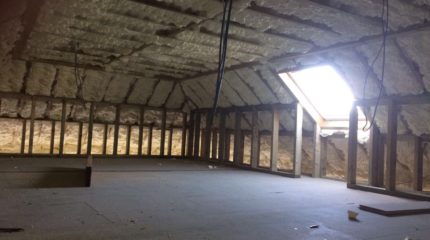What Is Icynene®? A Complete Guide to Icynene® Spray Foam Insulation
About IcyneneOur complete guide to Icynene® spray foam is designed to outline the benefits, answer frequently asked questions and bust common myths about the UK’s leading insulation material.
What is Icynene® made of?
Icynene® spray foam is one of the most energy efficient insulation products on the market. Icynene is made of polyurethane and is used for insulating roofs, lofts, walls, floors and much more. It is made from completely recycled material that does not contain any harmful gases, toxic chemicals or synthetic blowing agents, making it an eco-friendly solution for new and existing buildings.
How does Icynene® spray foam insulation work?
Icynene® spray foam expands up to 100 times its original size after the initial spray, which then hardens to fill every corner. This creates a completely air tight seal to provide energy efficient thermal insulation and reduce energy costs. Spray foam insulation can be used to solve condensation, soundproofing and heat loss issues in all types of residential, commercial and industrial properties.
Is Icynene® spray foam safe?
Icynene® spray foam insulation is completely safe and non-toxic, causing no harm to homeowners or our Icynene® installers. It is a 100% water-blown foam that does not contain any dangerous chemicals or gases. Homeowners can return to their property in as little as two hours after spray foam insulation has been installed, ensuring the foam has cured fully. Learn more about our spray foam process from start to finish.
To guarantee its safety, Icynene® has undergone laboratory tests, on-site evaluations, quality management checks and inspections of production. It has even been awarded BBA, IAB and ETA accreditations due to its safe, durable and eco-friendly qualities. It is also recommended by the Association for the Environmental & Chronic Toxic Injury (AMICA) and has been evaluated and listed in both the NHAB Research Center Green Approved products program and the Collaborative for High Performance Schools program (CHPS).
Due to the insulating and airtight properties Icynene® spray foam can offer, it can help to improve symptoms of conditions such as asthma and hay fever. This is because it is much more difficult for allergens and pollutants to enter your property. Thus, making your home much safer and more comfortable to live in.
What is the difference between open and closed cell foam?
There are two types of Icynene® spray foam insulation: open cell and closed cell foam. The main difference between open cell and closed cell Icynene® spray foam is that open cell is more flexible with a softer structure, whereas closed cell is rigid with a dense structure.
Icynene® open cell spray foam
Icynene® open cell spray foam is ideal for residential, loft, roof and walls as it is softer and allows the building to breathe naturally. It helps to improve soundproofing, reduce condensation and is installed with minimal disruption. Our Icynene® spray foam installers have insulated lofts and walls of homes in Sandbanks, Chelmsford, Sheppey, Essex and many more!
Icynene® closed cell spray foam
Icynene® closed cell spray foam is better suited to commercial and industrial buildings, as its ridged, dense structure makes it perfect for flooring, external and ceiling applications. Chessington Zoo needed to increase the warmth and comfort of their giraffes’ home without causing too much disruption, so in 2018 our Icynene® installers insulated their giraffe enclosure with spray foam insulation. Its environmentally friendly composition meant it was completely safe to apply without harming the animals.
Is Icynene® spray foam environmentally friendly?
Icynene® spray foam insulation is environmentally friendly with a range of green benefits. Unlike other forms of insulation, it contains zero toxic chemicals or gases and is composed of completely natural, recycled materials. It contains 99% pure air, reducing energy consumption and making buildings and homes much more sustainable. Consequently, homeowners that choose Icynene® spray foam will drastically reduce their carbon footprint and contribute towards cutting CO2 emissions by thousands of tons every year.
For the UK Government to meet their carbon emission goals by 2050, it could become a requirement to use spray foam insulation instead of any other form of insulation. Icynene® spray foam insulation has been independently tested as per ISO 16000-9 regulations, making it an industry trusted option with great environmental advantages.
Is spray foam insulation worth the extra cost?
Despite Icynene® foam insulation being more expensive compared to other forms of insulation, it is well-worth the investment and extra cost. This is because it is a highly durable material and provides homes with long-term energy and heat saving solutions. Due to the airtight seal it creates, Icynene® can help homeowners to save up to 50% on their energy bills. As well as reducing heating and cooling costs, it has an array of other benefits such as reducing mould growth, creating more comfortable living conditions and deterring rodents. Therefore, homeowners truly get their money’s worth when investing in Icynene® spray foam.
Will mould grow on spray foam insulation?
Mould cannot grow on spray foam insulation. This is because Icynene® spray foam is highly resistant to water, preventing moisture build-up. As mould requires moisture to grow, Icynene® stops mould in its tracks.
Does spray foam insulation cause moisture problems?
Icynene® foam insulation does not cause moisture problems within the home. It can actually help to improve the level of moisture within your home due to its airtight barrier that completely fills in any cracks or holes. This stops excess moisture from entering your home and building up, reducing the risk of damp and mould.
How long does spray foam insulation last?
Spray foam insulation can last for decades and even the lifetime of a property due to its extreme durability. Icynene® spray foam does not sag, deteriorate or become susceptible to damage like other forms of insulation. If it is installed by qualified Icynene® installers, you can expect a well-insulated home with zero maintenance for many years to come.
Can mice eat through spray foam insulation?
Mice and other rodents cannot eat through spray foam insulation. Icynene spray foam® is not a food or nesting source for animals, making it completely rodent proof. The airtight seal created by spray foam insulation also prevents small rodents from entering your home via holes and cracks.
Is spray foam better than fiberglass?
Spray foam insulation offers an array of benefits compared to fiberglass. Fiberglass has gaps that allows air to pass through, whereas Icynene® foam creates an airtight seal to effectively reduce heat loss. Spray foam is also completely resistant to water, whereas fiberglass can absorb water which can have a detrimental impact on its durability and structure. Icynene® foam insulation also has more eco-friendly benefits as opposed to fiberglass. This is because fiberglass frequently contains a chemical called formaldehyde, however Icynene® contains zero toxic chemicals or substances.
If you have any further questions about Icynene® spray foam insulation or are interested in insulating your home, get in touch with our friendly team at Mass Foam Systems. Simply call 0800 246 5051 or request a call back. We will be happy to assist you!
Back to blogs



